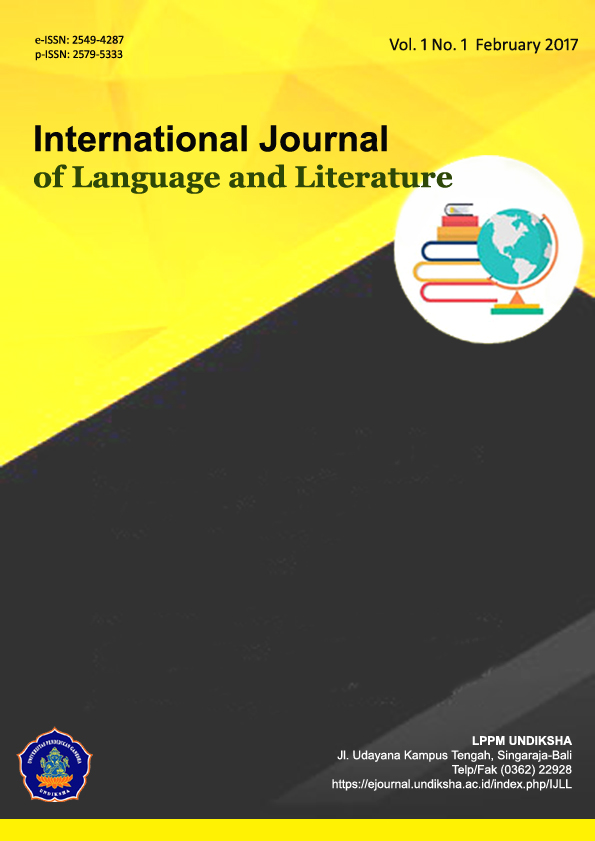RACHEL CHU AS LIBERAL FEMINIST IN KEVIN KWAN’S CRAZY RICH ASIANS (2013)
DOI:
https://doi.org/10.23887/ijll.v4i3.30297Keywords:
characterizations, crazy rich asians, liberal feminism, the main characterAbstract
This study aims to identify the characterization of Rachel Chu as a liberal feminist in Crazy Rich Asians, written by Kevin Kwan, published in 2013. By employing McKee's textual analysis with liberal feminism's perspective, the present study was designed in Miles' and Huberman's interactive model of qualitative data analysis. Through the repetitive and simultaneous process of data collection, data reduction, data display, and conclusion drawing, the present study elaborates on the characterizations of Rachel Chu as an attractive, intelligent, and independent woman representing Rachel Chu as a liberal feminist. Thus, it is implied that although the novel may be fairy-tale-like in the sense that it is centered in a romantic love story with a glamorous setting of the affluent society in Singapore, the novel also inserts feminist traits that can inspire its reader to be intelligent and independent like Rachel Chu as the main character in this novel.References
A’Yun, H. Q. (2019). Social Prejudice Reflected in Kevin Kwan’s Crazy Rich Asians Novel (2013): A Sociological Approach. Universitas Muhammadiyah Surakarta.
Fakhrian, A., & Islamiyati, D. N. (2017). Reading the value of liberal feminism in Hillary Clinton’s speech at the Democratic National Convention 2016. OKARA: Jurnal Bahasa Dan Sastra, 11(2), 277–286. DOI: https://doi.org/10.19105/ojbs.v11i2.1494
Hanifah, N., Zawawi, M., & Respatiyurisa, P. (2017). Liberal feminism in the File of Joan based on Naomi Wolf’ perscpective. Proceeding International Seminar on Language, Education, and Culture, 219–228.
Ifada, N., & Mufidah, Z. (2019). Social identify expression in Kevin Kwan’s Crazy Rich Asians. Prosodi, 13(2), 101–107. https://doi.org/10.21107/prosodi.v13i2.6087 DOI: https://doi.org/10.21107/prosodi.v13i2.6087
Kranz, D.L. and Mellerski, N.C. (ed). 2008. In/Fidelity: Essays on Film Adaptation. Newcastle: Cambridge Scholars Publishing.
Le, C. N., & Kang, M. (2019). Crazy Rich Asians. (June). https://doi.org/10.1111/socf.12511 DOI: https://doi.org/10.1111/socf.12511
McKee, A. (2003). Textual Analysis: A Beginner’s Guide. London: SAGE Publications. DOI: https://doi.org/10.4135/9780857020017
Miles, M. B., & Huberman, A. M. (1994). Qualitative Data Analysis (Second Edi). United States of America: SAGE Publications.
Pambudi, A. S. (2019). Romance Popular Formula Reflected in the Main Characters of Kevin Kwan’s Crazy Rich Asians. State Islamic University of Sunan Ampel Surabaya.
Ridwan, F., & Adji, M. (2019). REPRESENTASI FEMINISME PADA TOKOH UTAMA DALAM FILM CRAZY RICH ASIAN : KAJIAN SEMIOTIKA. Salaka, 1(2), 27–37. DOI: https://doi.org/10.33751/jsalaka.v1i2.1282
Rohmawati, D. W. I. (2018). Family conflict reflected in Kevin Kwan’s Crazy Rich Asians (2013): a sociological approach. Muhammadiyah University of Surakarta, 1–11.
Selden, R., Widdowson, P., & Brooker, P. (2005). A Reader’s Guide to Contemporary Literary Theory. In The Modern Language Review (5th Editio). https://doi.org/10.2307/3729614 DOI: https://doi.org/10.2307/3729614
Suaidi, Rusfandi, & Wilujeng, T. T. R. (2016). Feminism reflected in Pride and Prejudice novel by Jane Austen 2813. Jurnal Ilmiah Bahasa Dan Sastra, 3(1), 85–99. DOI: https://doi.org/10.21067/jibs.v3i1.1157
Sumar, W. T. (2015). Implementasi kesetaraan gender dalam bidang pendidikan. MUSAWA, 7(1), 158–182.
Suwastini, N. K. A. (2013). Perkembangan Feminism Barat dari Abad Kedelapan Belas Hingga postfeminisme: Sebuah Tinjauan Teoretis. 2(1), 198–208. DOI: https://doi.org/10.23887/jish-undiksha.v2i1.1408
Suwastini, N. K. A. (2014). In/fidelity: Menuju Kajian Adaptasi yang Lebih Kritis dan Terbuka. Seminar Nasional Riset Inovatif II.
Syva, A. N. (2019). Social Class Domination Over Proletarian Group in Kevin Kwan’s Crazy Rich Asians: Redefining Social Class Hierarchy as Familial and CUltural Tradi. Universitas Negeri Semarang.
Tong, R. (2009). Feminist thought (Third Edit). Westview Press.
Vijay, D. (2019). Development Review Crazy Rich Asians : Exploring Discourses of Orientalism , Neoliberal Feminism , Privilege and Inequality Crazy Rich Asians : Exploring Discourses of Orientalism , Neoliberal Feminism ,. 4(3). https://doi.org/10.23860/MGDR-2019-04-03-04 DOI: https://doi.org/10.23860/MGDR-2019-04-03-04
Yit, H. H. M. (2018). Capitalist Patriarchy in Singaporean Women ’ s Work and Consumption : Towards a Radical Discourse in Kevin Kwan ’ s Crazy Rich Asians. Southeast Asia: A Multidisciplinary Journal, 18, 55–70.
Downloads
Published
How to Cite
Issue
Section
License
IJLL Journal provides immediate open access to its content on the principle that making research freely available to the public to supports a greater global exchange of knowledge.

This work is licensed under a Creative Commons Attribution-ShareAlike 4.0 International License







